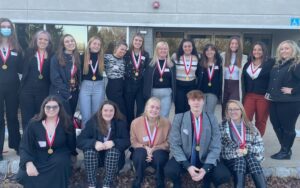
Jennifer Skomial, the 2019 New Jersey Teacher of the Year, teaches future educators at Morris County Vocational School District’s Academy for Education and Learning.
In a state proud of its top-rated education system, a teacher shortage is cause for immediate action. Many efforts are underway to help address the issue, but our county vocational-technical schools already have teacher preparation programs in place to engage the next generation and rebuild our broken teacher pipeline.
Once unanimously regarded as a noble and gratifying profession, teaching has lost some of its appeal over the years as our educators have faced public scrutiny over everything from their pay and benefits to what they are covering in the classroom, putting them in the center of recent culture wars. And during the pandemic, our educators worked overtime, but their efforts were sometimes under-appreciated by the equally stressed students and guardians opposite their screens.
This all accelerated the decline in young people entering the profession, but the potential in county-vocational schools gives me a reason for optimism.
These schools are in a unique position to help solve the teacher shortage because they educate future teachers.
Teacher training programs in our county vocational-technical schools are currently engaging and energizing the next generation of educators. To maximize their role in the teaching-shortage solution, these schools need to excite middle school students and parents as well. That starts with raising awareness about these programs and the opportunities they afford aspiring educators.
Misconceptions persist about the depth and breadth of career-focused programs offered at New Jersey’s county vocational-technical schools.
This past summer, Morris County Vocational School District hosted a summer camp for middle school students entering grades 5-8. The camp options included “Tomorrow’s Teachers,” a program introducing participants to the district’s Academy for Education and Learning.
That Academy’s teacher, Jennifer Skomial, says she was shocked to learn from campers’ parents that few – if any – knew the Academy existed as a four-year high school program.
Skomial, New Jersey State Teacher of the Year in 2019, is an alumna of the same program she now teaches in, which adds to the tremendous enthusiasm she has for it. “The future of the world is in my classroom,” she has said of her students.
When students leave Skomial’s classroom, they have been exposed to teaching every subject, at every grade level. She spends four years helping them develop important real-world skills such as making lesson plans, but also guides them toward finding their calling within education.
Skomial’s students spend time in the preschool located right on their high school campus; they visit local districts for experiences in elementary and middle school classrooms and they engage in service projects to connect lessons with the community. Their focused education also includes taking classes their senior year through local colleges and universities, which can earn them up to 24 credits.
Dual credit opportunities are common for students at county vocational-technical schools across the state, including in Hunterdon and Union counties, which have similarly structured teacher education programs.

Natalie Guarino, pictured far right, who oversees the Principles of Teaching program at Hunterdon County Polytech Career & Technical High School, accompanies a large group of aspiring educators to a recent Future Career and Community Leaders of America (FCCLA) Conference, where the students earned medals for demonstrating knowledge of the teaching profession.
Earning college credits while in high school not only saves students time and money, but also builds their confidence. They graduate knowing they can do the work, both in college and at the head of a classroom.
When Skomial’s students master their college classes, she notices them gaining more enthusiasm and determination to “stick with it.” Students at her school and the one in Union also get to take the Praxis Core skills tests that most collegiate teacher programs require — at the high schools’ expense.
By taking the tests so early, the students clear a major hurdle on the path to becoming a certified teacher before even entering college. Skomial says the math test skills are fresh in students’ minds, which should further boost their confidence and success.
Natalie Guarino, an instructor of the Principles of Teaching program at Hunterdon County Polytech Career & Technical High School, says that many of her students remain active as program alumni, sharing their experiences in college and the teaching profession.
She enjoys seeing how their coursework and participation in the school’s Future Career and Community Leaders of America (FCCLA) chapter influenced their career choices.
At the recent FCCLA Fall Leadership Conference, two teams of Guarino’s current students earned perfect scores – one for a “read aloud” paired with three activities to supplement student learning, and the other team for planning fun activities with the physical benefit of targeting large muscle groups.
Such Career and Technical Student Organizations, known as CTSOs, give Guarino’s students another opportunity to explore their personal teaching styles and areas of interest, as well as gain motivation from equally ambitious peers.
Nothing prepares high school students as fully to pursue a teaching career – among dozens of other professions – as a county vocational-technical program.
If we can spark an interest in the teaching profession early on, our students become invested in the pathway. They become even more prepared to enter our classrooms, ready to make a difference. This is one sustainable solution for addressing our teaching shortage and helping New Jersey’s schools stay on top.
By Jackie Burke
Jackie Burke is the executive director of the N.J. Council of County Vocational-Technical Schools.
Read this opinion piece at it originally appeared Jan. 27, 2023 on NJ.com



